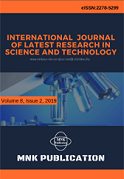DOI:10.29111/ijlrst ISRA Impact Factor:3.35
Research Paper Open Access
International Journal of Latest Research in Science and Technology Vol.3 Issue 4, pp 22-30,Year 2014
Correspondence should be addressed to :
Received : 22 July 2014; Accepted : 04 August 2014 ; Published : 31 August 2014

| Download | 125 |
|---|---|
| View | 179 |
| Article No. | 10349 |
This causal research is aimed at obtaining the effect of emotional intelligence, leadership style, and interpersonal communication on the principal’s decision making. Survey was applied in this study which data have been analyzed by path analysis after all variables put into correlation matrix. In this research, the school principals have been chosen as a unit analysis and 40 samples were selected randomly. The result of the study finds out that the principal’s decision making is effected directly by emotional intelligence, leadership style, and interpersonal communication. It also found that principal’s decision making is effected indirectly by emotional intelligence and leadership style as well, both through interpersonal communication. Based on those findings, it could be concluded that variation which occurred at decision making of the principals might have been effected by the variations of emotional intelligence, leadership style and interpersonal communication.
Copyright © 2014 Dr. Syarif Hidayat et al. This is an open access article distributed under the Creative Commons Attribution 4.0 International (CC BY 4.0) license which permits unrestricted use, distribution, and reproduction in any medium, provided the original work is properly cited.
Dr. Syarif Hidayat , " Analysis Of The Emotional Intelligence Influences, Leadership Style, And Interpersonal Communication On The Decision Making By Principals Of State Junior High Schools In South Jakarta, Indonesia ", International Journal of Latest Research in Science and Technology . Vol. 3, Issue 4, pp 22-30 , 2014

MNK Publication was founded in 2012 to upholder revolutionary ideas that would advance the research and practice of business and management. Today, we comply with to advance fresh thinking in latest scientific fields where we think we can make a real difference and growth now also including medical and social care, education,management and engineering.

We offers several opportunities for partnership and tie-up with individual, corporate and organizational level. We are working on the open access platform. Editors, authors, readers, librarians and conference organizer can work together. We are giving open opportunities to all. Our team is always willing to work and collaborate to promote open access publication.

Our Journals provide one of the strongest International open access platform for research communities. Our conference proceeding services provide conference organizers a privileged platform for publishing extended conference papers as journal publications. It is deliberated to disseminate scientific research and to establish long term International collaborations and partnerships with academic communities and conference organizers.